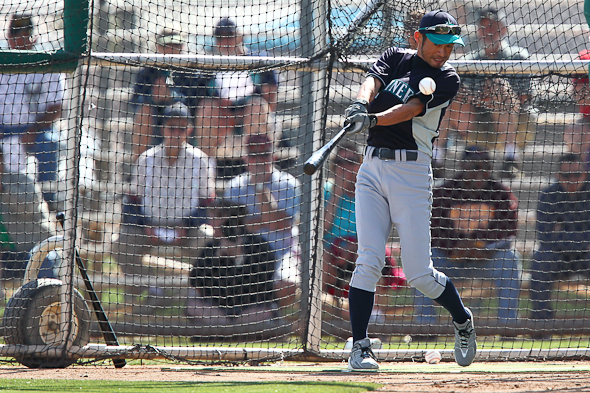
After 10 years of playing baseball for the Seattle Mariners, Ichiro Suzuki has lived in the United States long enough to become reasonably fluent in the English language.
Or so you would think.
Suggest to Ichiro that he speaks passable English, however, he demurs, in English, “No, no I dont.
If you press your luck and suggest that his English is better than your Japanese, he wakes up the Mariner clubhouse on a quiet March morning with the cry, in English again, of “Hell, no! HELL, NO! All around him, his teammates are dressing out for an early workout at Seattles spring training facility in Peoria, AZ. After a startled moment, they burst into laughter. Ichiro grins back at them.
Really, though. He speaks English in the clubhouse. He speaks English on the field. He speaks English in the Mariners television commercials. He speaks English because he lives in suburban Seattle from February to November and needs the language to get along.
At All-Star Games, where Ichiro has been an American League representative for 10 years running, Boston DH David Ortiz always prods him for a pre-game pep talk. Ichiros teammates report that his talk, while unprintable in many respects, is delivered in completely understandable English and is very funny.
Ichiro has had a number of interpreters over the last decade. His contract with the Mariners stipulates that they provide him one. The job is currently handled on a daily basis by American-born Antony Suzuki (no relation to Ichiro). It is up to Antony Suzuki to field the seemingly endless requests for the star right-fielders time.
When reporters ask Ichiro questions in English, much of the time he will understand and not need any translation. But he invariably answers in Japanese, leaving it to his interpreter to translate.
Other players who are non-native-English-speakers have taken the plunge and converse directly with American media and fans. Why not Ichiro? Why not, considering that after a decade of playing and living in the United States, he comprehends and speaks English competently?
Without waiting for a translation, Ichiro reaches into his locker, pulls out a small silver gadget that opens up into a small screen and keyboard. He uses his thumbs to hunt and peck for the phrase he wants. When he locates it, he puts the digital phrase finder down and starts talking in Japanese.
“We have to connect to our fans through the media, and when you talk about that, its got to come from your heart, Ichiro says through Antony Suzuki. “And when it comes from your heart, it has to be absolutely consistent.
“Theres a big risk you take without an interpreter, because as professional baseball players, we are here to perform baseball, not to learn a language.
It is suggested that Ichiro could, as others have done, try to do both.
It is re-suggested by Ichiro that if hes ever heard a bad idea, thats it.
“There is a point in learning the language, obviously, he says through his interpreter, “but thats not where my priority is. From my perspective and from my philosophy its tough to study a second language.
“When you look at me, its tough to express my feelings in Japanese (let alone English). I have that kind of theory, thats why its impossible for me to speak in English like I do in Japanese. If I would study English and try to perform at my level, thats like putting the cart before the horse.
Putting the cart before the horse. That, if you havent guessed already, is the phrase Ichiro looked up in his digital gizmo.
“To make a long story short, he continues, “in my point of view Id rather swing the bat for the team instead of studying English. But I dont want you take it in a bad way.
“Its just that I dont want that to affect my performance, because Im here to perform for the fans, the team and the city. Being myself, I have a lot of tension; there are a lot of people who look at me. That said, I have to be respectful to our fans. And I have to be consistent with what is said and not have it taken the wrong way because thats how I feel.
“The best way for me to do that is to speak in Japanese.
The Japan-based writers who have covered Ichiro for long periods of time are the first to confirm Ichiros assertion that he has trouble making his point in Japanese. Hes frequently philosophical when talking about baseball, whether in English or Japanese, and it seems that they dont always get his reference points.
Nor does the American media. Theres a lot of truth in the phrase that Ichiro didnt look up the one that reads, “Things get lost in translation.
Still, Ichiro says, he wants to be understood by his English-speaking fans.
“Obviously, I feel more comfortable after being (in the United States) 10 years, he says when asked about Ichiro 2001, versus Ichiro 2011. “Im not as much a foreigner as I was my first year.
“I still feel like a foreigner, though. Thats something that you cant change. But I like Seattle. If I have the luxury to stay both here and in Japan when Im done playing, Id love to stay here part of the year.
There might even be time then for those English lessons.
Twitter: @JHickey3
